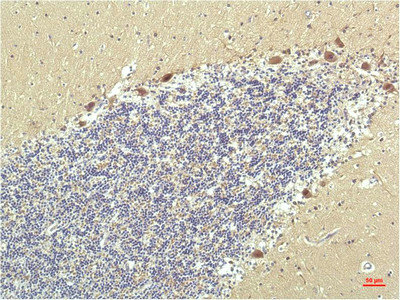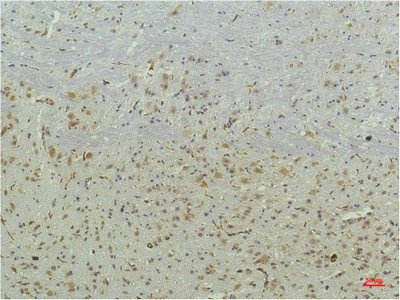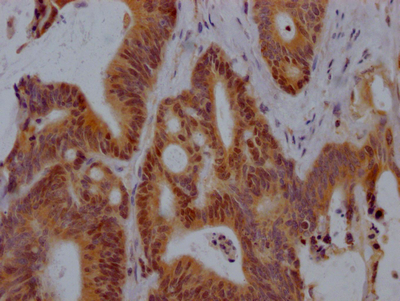PPARD Monoclonal Antibody
-
货号:CSB-MA294484
-
规格:¥660
-
图片:
-
其他:
产品详情
-
Uniprot No.:Q03181
-
基因名:
-
别名:FAAR antibody; MGC3931 antibody; NR1C2 antibody; NUC1 antibody; NUCI antibody; NUCII antibody; Nuclear hormone receptor 1 antibody; Nuclear receptor subfamily 1 group C member 2 antibody; Peroxisome proliferative activated receptor delta antibody; Peroxisome proliferator-activated receptor beta (PPAR-beta) antibody; Peroxisome proliferator-activated receptor beta antibody; Peroxisome proliferator-activated receptor delta antibody; PPAR beta antibody; PPAR-beta antibody; PPAR-delta antibody; PPARB antibody; ppard antibody; PPARD_HUMAN antibody
-
宿主:Mouse
-
反应种属:Human,Mouse,Rat
-
免疫原:Recombinant Protein of PPAR Delta of PPAR Delta
-
免疫原种属:Homo sapiens (Human)
-
标记方式:Non-conjugated
-
纯化方式:The antibody was affinity-purified from mouse ascites by affinity-chromatography using specific immunogen.
-
浓度:It differs from different batches. Please contact us to confirm it.
-
保存缓冲液:Liquid in PBS containing 50% glycerol, 0.5% BSA and 0.02% sodium azide.
-
产品提供形式:Liquid
-
应用范围:ELISA,IHC
-
推荐稀释比:
Application Recommended Dilution IHC 1:100-1:200 -
Protocols:
-
储存条件:Upon receipt, store at -20°C or -80°C. Avoid repeated freeze.
-
货期:Basically, we can dispatch the products out in 1-3 working days after receiving your orders. Delivery time maybe differs from different purchasing way or location, please kindly consult your local distributors for specific delivery time.
相关产品
靶点详情
-
功能:Ligand-activated transcription factor. Receptor that binds peroxisome proliferators such as hypolipidemic drugs and fatty acids. Has a preference for poly-unsaturated fatty acids, such as gamma-linoleic acid and eicosapentanoic acid. Once activated by a ligand, the receptor binds to promoter elements of target genes. Regulates the peroxisomal beta-oxidation pathway of fatty acids. Functions as transcription activator for the acyl-CoA oxidase gene. Decreases expression of NPC1L1 once activated by a ligand.
-
基因功能参考文献:
- Results suggest that peroxisome proliferator-activated receptor beta overexpression is not an inherent property of breast cancer cell lines, but it may play a role through activation of downstream genes (PPARbeta). PMID: 12009300
- 4 polymorphisms were found: -409C/T (promoter, +73C/T (exon 1), +255A/G (exon 3), & +294T/C (exon 4). An interaction with the PPAR alpha L162V polymorphism was also detected for several lipid parameters. PPARD plays a role in cholesterol metabolism. PMID: 12615676
- The 15-lipoxygenase-1 product 13-S-hydroxyoctadecadienoic acid down-regulates PPAR-delta to induce apoptosis in colorectal cancer cells. PMID: 12909723
- results implicate PPAR-delta in the regulation of intestinal adenoma growth PMID: 14758356
- Positive associations of PPAR-delta polymorphisms with fasting plasma glucose and BMI detected in nondiabetic control subjects PMID: 14988273
- gene regulation by PPARdelta in the uterine cells uniquely responds to SRC-2, N-CoR, SMRT, or RIP140, and these interactions may be operative during implantation when these cofactors are abundantly expressed. PMID: 15001550
- PPAR-beta/delta activation stimulates keratinocyte differentiation, is anti-inflammatory, improves barrier homeostasis, and stimulates triglyceride accumulation in keratinocytes. PMID: 15102088
- 11beta-HSD2 is an additional target for PPAR delta, which may regulate human placental function PMID: 15591138
- This study was performed to determine whether specific activation of PPARdelta has direct effects on insulin action in skeletal muscle. PMID: 15793256
- COX-2 immunopositivity was significantly associated with PPARbeta and PPARgamma immunoreactivity. Microvessel density was significantly higher among PPARbeta-immunoreactive squamous cell carcinomas. PMID: 15811118
- PPARdelta signaling pathways are interconnected at the level of cross-regulation of their respective transcription factor mRNA levels PMID: 15890193
- PPARdelta expression is up-regulated between the first and third trimester, indicating a role for this nuclear receptor in placental function PMID: 15979543
- PPARdelta + 294T/C gene polymorphism in subjects with metabolic syndrome may be involved in the occurrence of obesity and dyslipidemia. PMID: 16053787
- PPARdelta partially rescued prostate epithelial cells from growth inhibition and also dramatically inhibited sulindac sulfide-mediated p21WAF1/CIP1 upregulation. PMID: 16091736
- PPARdelta +294T/C polymorphism has no influence on plasma lipoprotein concentrations, body mass index or atherosclerotic disease either in healthy subjects or in patients with DM-2, both in males and females. PMID: 16285997
- Single nucleotide polymorphisms of PPARD primarily affected insulin sensitivity by modifying glucose uptake in skeletal muscle but not in adipose tissue. PMID: 16306381
- The expression of PPARdelta gene in rectal cancers is not statistically different from normal mucosa. PMID: 16361076
- Human platelets contain PPARbeta and that its selective activation inhibits platelet aggregation. PMID: 16368717
- Data describe the activated form of the peroxisome proliferator-activated receptor-beta/delta using a ligand binding domain model. PMID: 16387648
- This review concludes that PPAR delta has emerged as a powerful metabolic regulator in diverse tissues including fat, skeletal muscle, and the heart. PMID: 16511591
- PGI2 protects endothelial cells from H2O2-induced apoptosis by inducing PPARdelta binding to 14-3-3alpha promoter, thereby upregulating 14-3-3alpha protein expression. PMID: 16645156
- data provide further evidence for an involvement of PPARdelta in the regulation of BMI. PMID: 16652134
- Skeletal muscle mRNA expression of PPAR delta increased in type 2 diabetic patients with an improved clinical profile following low-intensity exercise, but were unchanged in patients who did not show exercise-mediated improvements in clinical parameters. PMID: 16752430
- Single nucleotide polymorphisms in PPARD modify the conversion from glucose intolerance to type 2 diabetes. PMID: 16804087
- Therefore, these results indicate that induction of fatty acid oxidation with PPARbeta activators during short-term exposition is not sufficient to correct for insulin resistance in muscle cells from type 2 diabetic patients. PMID: 16897074
- PPARbeta/delta is a novel regulator of endothelial cell proliferation and angiogenesis through VEGF. PMID: 17068288
- PPARD-87T/C polymorphism is associated with higher fasting plasma glucose concentrations in both normal glucose tolerant and diabetic subjects, largely due to impaired insulin sensitivity PMID: 17116180
- PPAR-delta activation increases cholesterol export and represses inflammatory gene expression in macrophages and atherosclerotic lesions. PMID: 17119917
- support the rationale for developing PPARdelta antagonists for prevention and/or treatment of cancer PMID: 17148604
- These studies demonstrate that ligand activation of PPARbeta/delta does not lead to an anti-apoptotic effect in either human or mouse keratinocytes, but rather, leads to inhibition of cell growth likely through the induction of terminal differentiation. PMID: 17254750
- DNA sequence variation in the PPARdelta locus is a potential modifier of changes in cardiorespiratory fitness and plasma HDL-C in healthy individuals in response to regular exercise. PMID: 17259439
- Low PPARD expression is associated with Prostate Cancer Growth. PMID: 29187400
- Study demonstrates that oleanolic acid, as a natural product, can ameliorate the high glucose-triggered endothelial function by activating the nuclear receptor PPARdelta. PMID: 28067284
- PPARD rs7770619 is a novel candidate variant for impaired fasting glucose and type 2 diabetes and shows association with malondialdehyde levels. PMID: 29776318
- The negative responders for aerobic training are carriers of the PPARD rs2267668 G allele. The best responders to aerobic training are PPARD rs1053049 TT and rs2267668 AA. PMID: 29762540
- The current results suggest that A/A carriers of PPAR-delta SNP (rs2267668) may enjoy fewer beneficial effects of exercise-centered lifestyle intervention on anthropometric indices and blood measurements. PMID: 29494521
- Polymorphism of PPARD is associated with late onset of type 2 diabetes mellitus. PMID: 28292576
- findings suggest that PPARdelta conditions CLL cells to survive in harsh microenvironmental conditions by reducing oxidative stress and increasing metabolic efficiency. PMID: 28050012
- Here, thes describe a novel PPARbeta/delta-dependent molecular cascade involving TGFbeta1 and miR-21-3p, which is activated in the epidermis in response to UV exposure. PMID: 27250636
- findings identified previously unrecognized role of IP-PPARdelta signal transduction pathway in the production of sAPPalpha in cerebral microvasculature. PMID: 26661245
- the metabolic events, controlled by PPARs, occurring during neuronal precursor differentiation, the glucose and lipid metabolism was investigated. PMID: 27860527
- PPAR-delta activation prevents in-stent restenosis and stent thrombosis. PMID: 27283742
- findings identify LPCAT3 as a direct PPARdelta target gene and suggest a novel function of PPARdelta in regulation of phospholipid metabolism through LPCAT3. PMID: 27913621
- The minor allele of rs2016520 and rs9794 in PPAR-delta and interaction between rs2016520 and non-smoking were associated with decreased risk of CVD. PMID: 28287878
- a novel SNP x SNP interaction between rs2267668 in PPARdelta and rs7191411 in EMP2 that has significant impact on circulating HDL-C levels in the Singaporean Chinese population. PMID: 27530449
- Results indicate that PPARdelta-mediated downregulation of Nox4 modulates cellular redox status, which in turn plays a critical role in extracellular matrix homeostasis through ROS-dependent regulation of MMP-2 activity. PMID: 26403493
- The PPAR-beta role in neuroblastoma cell tumorigenesis and differentiation PMID: 27996177
- These observations candidate PPARs as new biomarkers of follicle competence opening new hypotheses on controlled ovarian stimulation effects on ovarian physiology. PMID: 26332656
- The PPAR delta role in neuroblastoma cell tumorigenesis and differentiation PMID: 27996177
- PPARdelta activation may be a potential risk of atherosclerosis through enhancing activity of SMS2 PMID: 27278004
显示更多
收起更多
-
亚细胞定位:Nucleus.
-
蛋白家族:Nuclear hormone receptor family, NR1 subfamily
-
组织特异性:Ubiquitous with maximal levels in placenta and skeletal muscle.
-
数据库链接:
HGNC: 9235
OMIM: 600409
KEGG: hsa:5467
STRING: 9606.ENSP00000310928
UniGene: Hs.696032
Most popular with customers
-
-
Phospho-YAP1 (S127) Recombinant Monoclonal Antibody
Applications: ELISA, WB, IHC
Species Reactivity: Human
-
-
-
-
-
-






















